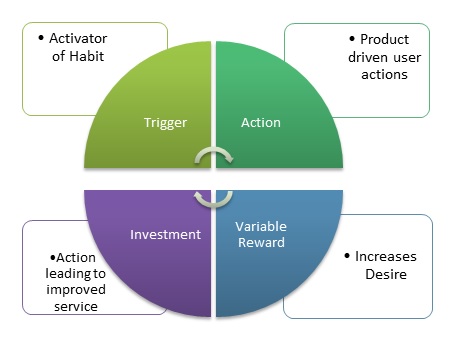- Business Concepts ›
- Marketing and Strategy ›
- Habit Formation
Habit Formation
Definition, Importance, Types & Example
This article covers meaning & overview of Habit Formation from marketing perspective.
What is meant by Habit Formation?
Habit formation is a continuous & repetitive activity done by companies to define the habits of a customer. Habit formation of customer helps a company have loyal customers and build a strong equity. Customer habit Formation came out to be a robust and strong objective for communication.
Importance of Habit Formation
Habit formation is a process to drive the consumer buying behaviour. Habit is something which is formed by repetitive actions and activities of an individual which he/she consider as useful and valuable which led that same behaviors turn into habit. Nowadays, companies want to inculcate certain habits into their employees and their customers. Most of the companies rely on habit formation products & communication that fulfill and satisfy consumer’s needs and wants.
That in turn helps the company in increasing CLV (customer lifetime value) and maintaining customer loyalty for the company.
With growing technological advancements, people are becoming more tech-savvy and are always engaged in phones, tablets and other electronic devices. Habit formation is a type of addiction that a company drives for a customer to lead to habitual buying. Everyone is so curious to know what’s happening in other person’s life that people have formed a habit of scrolling through their Facebook news feed multiple times a day even if they don’t have any new posts to check. Also, as most of the people are inclined towards online shopping, they have formed a habit of using phones to browse through different online shopping sites like Amazon, Flipkart, Myntra etc. to search for the products they wanted. Many of the companies are studying the behavior and characteristics of the habits of the population they are targeting and accordingly devising their marketing strategy to cater to their demands. This is to enhance habit formation among customers. The main mantra of a business plan is to position its products in such a way that the sales of its products and services will happen according to customer’s habit so that they will purchase even without a second thought. Repeat purchase of a brand is known as habit buying.

Read More
Types of Habit Formation
Many companies follow the Hook Model for creating habit forming products which explains about Trigger (the activator of habit), Action (product driven user actions), Variable Reward (activates and increases desire) and Investment (an action leading to improved service, expressing preferences). Hence, this Hook Model leverages this kind of user commitments and make the trigger more appealing, the action simpler, the reward more inspiring with every hook cycle.
Advantages & Disadvantage of Habit Formation
Some advantages are of habit formation are:
1. Good habit formation is boon as it makes a person’s life simpler and better.
2. In long run, good habit gives us very little stress and strain which can bring stability and security to one’s life.
Some disadvantages are:
1. Bad habit formation is bane as it can make one’s life disturbed and can lead to chronic disorders.
2. This one bad habit can affect other behaviors of a person.
Examples of Habit Formation
1. Nowadays with the advent of technology, whenever we become very much curious to know about other’s whereabouts and what are they doing, we check Facebook several times in a day. That eventually turns into a habit. This habit formation gives a boost to the marketers to promote their product through ads which can help them in increasing the visibility of their products and services, which in turn increase their sales and revenue.
2. Beverage & Cola brands drive a habit formation among customers to drink the beverages along with meals or in theatres or in a restaurant. This becomes a substitute of water, and this habit change helps drive business.
Hence, this concludes the definition of Habit Formation along with its overview.
This article has been researched & authored by the Business Concepts Team which comprises of MBA students, management professionals, and industry experts. It has been reviewed & published by the MBA Skool Team. The content on MBA Skool has been created for educational & academic purpose only.
Browse the definition and meaning of more similar terms. The Management Dictionary covers over 1800 business concepts from 5 categories.
Continue Reading:
What is MBA Skool?About Us
MBA Skool is a Knowledge Resource for Management Students, Aspirants & Professionals.
Business Courses
Quizzes & Skills
Quizzes test your expertise in business and Skill tests evaluate your management traits
Related Content
All Business Sections
Write for Us